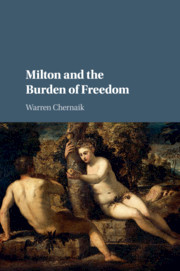Description
Milton and the Burden of Freedom
Author: Chernaik Warren
This book examines the unresolved tensions in Milton's writings, as he grapples with the paradox of freedom in a universe ruled by an all-powerful God.
Language: EnglishApproximative price 32.87 €
In Print (Delivery period: 14 days).
Add to cart
Milton and the Burden of Freedom
Publication date: 02-2019
Support: Print on demand
Publication date: 02-2019
Support: Print on demand
Approximative price 112.79 €
In Print (Delivery period: 14 days).
Add to cart
Milton and the Burden of Freedom
Publication date: 01-2017
Support: Print on demand
Publication date: 01-2017
Support: Print on demand
Description
/li>Contents
/li>Biography
/li>
Throughout his writings, Milton, deeply engaged in political and theological controversy, sought to clear a space for human freedom in a world ruled by an omniscient and omnipotent deity. Paradise Lost and Samson Agonistes, as well as other works by Milton in verse and prose, explore the problematical aspects of a universe ruled by an Old Testament God of wrath, demanding obedience, who allows his creatures the freedom to be 'authors' of their own fate. Milton and the Burden of Freedom examines the contradictions inherent in Milton's religious, political, and ethical beliefs as expressed in his poems, prose writings, and the treatise De Doctrina Christiana. Milton, whose writings are rooted in the Reformed tradition while challenging Calvinist orthodoxy, is both radical and conservative. In this book, Warren Chernaik traces the evolution of Milton's attitude towards freedom, servitude and virtue during a century of political upheaval and disappointed hopes.
Introduction. Free to fall: Milton and the Old Testament God; 1. Milton's post-Calvinist theology; 2. 'Providence their guide': providence in Milton; 3. The unpolluted temple of the mind: virtue on trial; 4. Classical and Biblical Republicanism: Milton and some contemporaries; 5. Victory's crest: Milton, the English nation, and Cromwell; 6. Monarchy and servitude: the politics of Paradise Lost; 7. God's just yoke: power and justice in Paradise Lost; 8. 'Tyrannie must be': Milton and the Restoration; Postscript.
Warren Chernaik is Emeritus Professor of English, University of London. He was the founding Director of the Institute of English Studies (IES), University of London, and is now a Senior Research Fellow of IES. He is the author of The Myth of Rome in Shakespeare and his Contemporaries (Cambridge, 2011), The Cambridge Introduction to Shakespeare's History Plays (Cambridge, 2007), a study of The Merchant of Venice (2005), Sexual Freedom in Restoration Literature (Cambridge, 1995) and The Poet's Time: Politics and Religion in the Work of Andrew Marvell (Cambridge, 1983). He has also published essays on such authors as Marvell, Milton, Shakespeare, Jonson, Herbert, Traherne, Rochester, Pepys, and Behn, and has co-edited books on topics as diverse as detective fiction, changes in copyright law, and Andrew Marvell.
© 2024 LAVOISIER S.A.S.
These books may interest you

The Value of Milton 26.37 €




